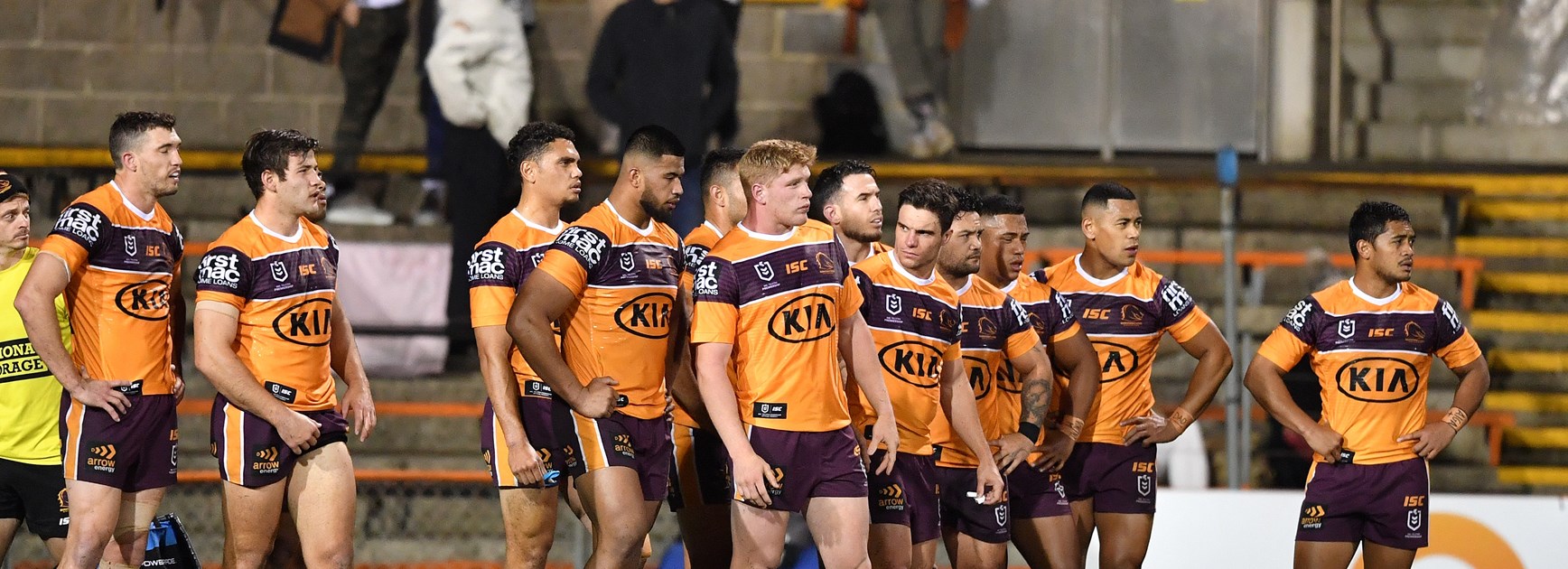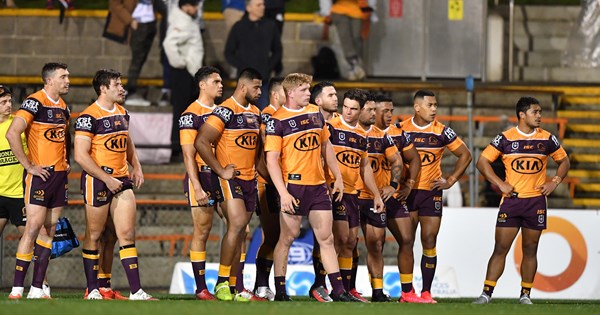Super Freak
International Captain
Forum Staff
- Jan 25, 2014
- 44,041
- 33,056

The psychology behind how Broncos can get out of form slump
Shayne Duncan
Performance Psychologist
Wednesday 22nd July, 2020
Last year it was the Panthers and the year before it was the Eels who were under the blowtorch due to form slumps that defied logic and expectations. This year it's the Broncos.
What should give Brisbane fans some encouragement is that Penrith and Parramatta turned it around and now are at the top of the Telstra Premiership ladder, so there is certainly light at the end of the tunnel.
As a psychologist, it's wise to follow the mantra "prescription without diagnosis is malpractice".
When teams or individual athletes are in a form slump everyone comes out of the woodwork to offer a solution.
Here's where the wannabe gurus and snake oil salespeople prey on those who are down and vulnerable. It's not uncommon for some sporting organisations to receive 500 emails per day when going through a form slump.
Diagnosis of a slump
As far as a diagnosis goes, the Broncos are in a typical form slump, with some added intensity due to additional factors.
Firstly, they are a proud club with a history of success.
Secondly, they are a one-team town with a huge fan base.
Finally, they have a relatively new coach who came into the job last year in a controversial manner.
These three factors have nothing to do with the football being played, but they significantly add to the pressure on the staff and players. Too much pressure doesn’t help people perform at the level they are capable of achieving.
So, what are the features of a form slump?
Losing is the obvious one. A string of defeats is the giveaway, but any decent coach will tell you it’s possible for teams to have poor form and still win.
What separates a form slump from a regular loss is the nature of the performance - the way the loss was produced.
Seibold has publicly stated the team lacks resilience and that was certainly on show in the 48-0 loss against the Wests Tigers, who basically bashed the Broncos from the opening whistle and delivered the knockout blow in the first half with Benji Marshall's try.
What was telling about this try is how it eventuated.
Sure, it came off an error, but more importantly, it came off the back of players being passive and not catching a kick - they let it bounce and a string of events unfolded that led to the try.
When teams are in a form slump, players revert to going through the motions to save their job.
It's all about creating the appearance they are doing their job.
Specifically, they say all the right things like "we're disappointed with that performance, it’s just not good enough and we’re working hard to turn it around, blah, blah, blah".
The problem is you can only say this stuff for so long before someone has to call BS.
On the training paddock, going through the motions looks like players being in the position they are meant to be in, but they will lack the intensity and purpose they need to successfully execute the play.
This is what happened for the Marshall try to be scored.
There were three Broncos in the frame when that kick bounced. One player was ducking his head to avoid a Falcon. So, the players were there. They were in the right spot, but none of them attacked the ball with the intent to catch it on the full.
Eventually, a Bronco grabs the bouncing ball, but he is under immediate pressure due to three Tigers defenders. He spills the ball in the tackle which Marshall scoops up to score. Game, set and match right there.
What should have happened was a Broncos player calls for the ball and catches it on the full, gets smashed by the chasers, but diffuses the risk and starts a yardage Broncos set with the ball.
The try to Tigers forward Luciano Leilua off the drop-out is a similar story. Broncos players are in the frame but there's no intent to regather the ball or make the tackle.
One Bronco slips over trying to regather the ball, another makes a poor attempt at a tackle and the third one is too late to stop the try.
At the other end of the field, the same thing unfolds. Brisbane only had one decent scoring opportunity all game, late in the first half.
The Broncos had what looked like a four on three on the left edge, but Anthony Milford put in a kick that went dead instead of going through the hands.
This happens during a form slump as nothing appears to go your way and poor decisions are made out of trying too hard to make things happen to produce a result.
Going through the motions is a hallmark sign of a team in a slump and Brisbane's performances are full of them.
Working hard isn't going to fix it. They need to work smart.
Blame culture in disconnected team
Another telltale sign of a form slump is players become disconnected as a blame culture creeps in.
Players want to distance themselves from any errors so they avoid the blame and keep their spot in the team.
No one wants to stick their neck out and put their spot at risk so players just do their own job and stop looking after their mate.
In a team sport like rugby league, this is the death knell. You can see how disconnected the players are when they are in a huddle after the opposition scores.
As the score blows out, players start to physically separate themselves from each other and the huddle spreads out further and further. The Broncos aren't connected here.
Some players are talking among themselves, others are standing on their own and only a few are listening to what their trainer, Allan Langer, has to say. That speaks volumes.
Solutions can work quickly
So how do you fix it?
The first thing you need to do as a coach of a team in a form slump is get the group re-connected.
They are not going to get out of it on their own as individuals. They have to start playing for each other again for this to turn around.
That means people have to put aside any differences they may have or any gripes they have about what position they are playing or the game plan and so on.
This is the toughest part. You need a catalyst or a trigger that sparks the group back together. Sometimes that trigger comes from an external source.
I have done plenty of these sessions. This is how they unfold.
You start by recognising the divisions and issues and you clean the slate so there is no baggage. The next task is to set out the plan to follow to turn things around. Then you look for buy-in from the group.
If the message resonates and connection happens, you are on your way.
The reality is form slumps can be solved in a heartbeat. It just takes a decision.
Players have to decide to let go of all the stuff holding them back and be willing to step up and do what it takes to turn things around, no matter what. If they decide as a group, you are in business.
This leads to the next step – the effort performance, which puts these words into action.
The talk now stops.
Talk is cheap, especially when in a form slump.
One team I worked with banned talking. Their mantra was simply "show me", which is all about taking action. Action, action, action.
Once your group is reconnected, the next task is to experience that connection on the field in the heat of battle.
Sport is about timing, rhythm and skill execution and there are so many things that can disrupt all of those, such as pressure, fear, job security and so on.
Players need to start playing for each other, putting their body on the line again, taking the hard carries and getting smashed by catching bombs under pressure.
The effort performance is all about competing on every play. It's not about winning.
You need an effort performance before you can win, so this is where you start when resurrecting from a form slump.
In 2019, Penrith's effort performance turned out to be a game they won. That can happen. Sometimes it takes a game or two to develop the consistency in effort needed to win games.
By shifting your team's focus away from all the infighting, media scrutiny and usual pressure from expectations they can just focus on one simple thing. A single focus leads to increased performance and that leads to a win.
Eventually, the breakthrough moment will happen. Then the task becomes sustaining it by staying connected and not getting too carried away with results. You do that by sticking to effort as the priority and the focus.
Season can be salvaged
As a coach, your job depends on wins. For Seibold, this is the pathway to achieve what he needs to achieve to stay a Bronco.
There are 10 weeks left in the regular season to turn it around, which is great. This is how I would split up the 10 weeks.
Weeks 1,2,3: Looking for effort performances and the breakthrough. Give your players room to get this right as you are building the platform here. Look to win one from three as a pass mark.
Weeks 4,5,6: Building on the breakthrough win and consolidating effort performances. Winning brings confidence, so look to win two from three as a pass mark.
Weeks 7,8,9,10: By now a pattern and habit should be in place that can be ramped up. Here, the team should be firing on all cylinders and the players have our groove back. A pass mark is two out of four, but you are looking for three or four victories.
That only leaves one question. Can Seibold do it?
We will find out over the next 10 weeks.
Shayne Duncan is a performance psychologist who has worked in several sports with a particular interest in rugby league.
The views in this article do not necessarily express the opinions of the NRL, ARL Commission, NRL clubs or state associations.
NRL.com







